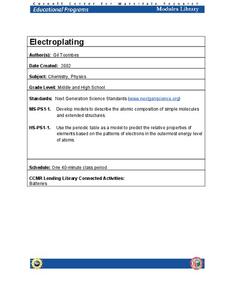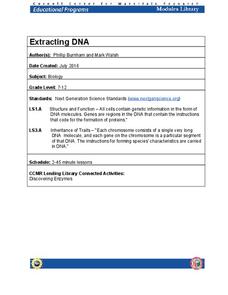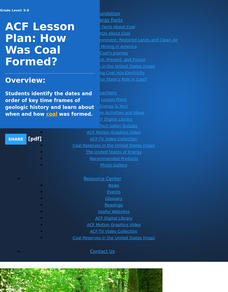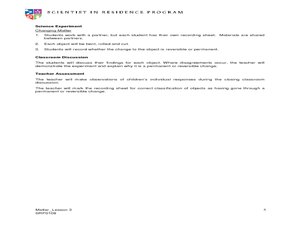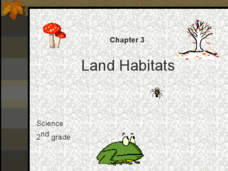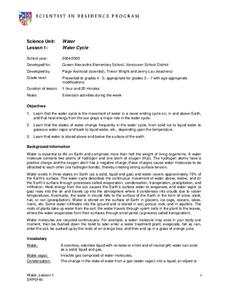Core Knowledge Foundation
Seasons and Weather: Supplemental Guide
From warm summer days to cold winter nights, this 10-lesson unit takes children on an exploration of seasons. Using the included reading passages and images, a series of read-aloud lessons and vocabulary activities provide young children...
Curated OER
Electricity and Food: From Glowing Pickles in Citrus Batteries
Fifth graders explore electrical concepts and host a guest speaker. This instructional activity sets up guidelines for students to follow when they have a guest speaker. Students are primed to become actively involved in a lecture or...
Cornell University
Electroplating
Silver pennies and copper nickels are made possible by applying some chemistry. Learners use electrolysis to coat a penny with zinc sulfate and a nickel with copper sulfate. Their investigation builds an understanding of electroplating...
Cornell University
Light Waves: Grades 9-12
Explore the behavior of light waves with a lab activity. Scholars build new vocabulary through experimentation and observation. Using different mediums, they model reflection, refraction, transmission, diffusion, and scattering of light.
Ask A Biologist
Viral Attack
Can you catch the same cold twice? Elementary and middle schoolers learn about what happens when a virus attacks their bodies, and how the immune system never forgets a virus, with an entertaining comic book. The packet includes...
It's About Time
Monitoring Active Volcanoes
The fastest growing volcano in recorded history grew more than 150 meters in less than a week and to more than 424 meters in less than a decade. How do we safely monitor active volcanoes? Young scientists design an instrument to measure...
Teach Engineering
Earthquakes Living Lab: FAQs about P Waves, S Waves and More
Let's talk about earthquakes .... Using the Internet, pupils research what causes earthquakes, how scientists measure them, their locations, and their effects. The resource is not only informative, but it also builds crucial research...
Teach Engineering
Accelerometer: Centripetal Acceleration
Scholars build robotic arms that swing back and forth and use them to collect velocity and acceleration data. To analyze the results, pupils compare data to the equations for angular velocity and centripetal acceleration.
Polar Trec
Nature's Density Column
Nature provides density columns in the polar regions that provides food for many animals. Young scientists build their own density columns with water in order to answer analysis questions. Through a slideshow presentation, scholars...
Discovery Education
How's the Weather?
Young meteorologists explore different aspects of the weather while learning about measurement devices. They build instruments and then set up a weather station outside and measure temperature, humidity, air pressure, wind speed, and...
American Institute of Architects
Architecture: It's Elementary!—Fifth Grade
Young citizens construct an understanding of urban planning in this cross-curricular unit. Covering every aspect of city development from the political, economic, and social influences to sustainable building practices, this 10-lesson...
Brooklyn Children’s Museum
Volcanoes!
Give young geologists an up close and personal look at volcanoes with a series of hands-on earth science lessons. Whether they are investigating the properties of igneous rocks, building their own volcanoes, or making fudge to model the...
LABScI
Taxonomy: Who is in My family?
Find similarities in seemingly unlike organisms. The second instructional activity in a series of 12 builds the concept of a taxonomy and explores the use of a dichotomous key. Learners begin in part one by attempting to group a set of...
Cornell University
Extracting DNA
Uncover the basics of DNA structure through exploration activities. Collaborative groups build DNA models and recreate the process of replication. Then, using plant cells such as peas or strawberries, they extract a DNA sample.
Consortium for Ocean Science Exploration and Engagement (COSEE)
Understanding the Food Web
Building on prior knowledge of the pervious lesson in the series, pupils explain the previous lesson to each other. Then they write a simple guide for a young child to read on the same topic.
Curated OER
How Was Coal Formed?
Geology can be a lot of fun. Learners review geology related vocabulary, make flashcards, use encyclopedias to answer questions, then explore the formation of coal. They identify dates and order them into key time frames of geologic...
Curated OER
Woolly Mammoths: Anticipation Guide
Use this presentation to build prior knowledge and clear up any misconceptions about Woolly Mammoths prior to reading about them. Students will answer 6 true or false questions priming them with facts related to Woolly Mammoths. This is...
Curated OER
Physical Changes to Matter
Pupils explore matter by conducting an in-class experiment. They experiment with water's various forms by melting and freezing water, identifying its new shape. These observations are recorded to supplement later discussion. They also...
Curated OER
Land Habitats: Grade 3 Science
Build your students scientific vocabulary with this slide show on land habitats. Each slide provides a vocabulary word, image, and definition of a term common to habitats and the environment. Great for science class or as comprehensible...
Curated OER
Water Cycle
Young scientists explore Earth elements by conducting an experiment. They define water vocabulary terms such as condensation and precipitation. In addition, they conduct a water experiment in which they build a terrarium, so they can...
Curated OER
Electricity
Give your science lesson a charge with this presentation on electricity. Each slide contains vocabulary or great information on what electricity is and how it works. Note: This resource would be even better if accompanied by a video and...
Curated OER
Build Your Own Insect Trap
Young scholars ask testable questions. They explain the relationship between insect behavior and insect trapping techniques. Students design their own insect traps to collect a new unknown insect, in the same way that entomologists...
Purdue University
Getting the Dirt on Decomposition
Sometimes science requires getting a little dirty. A hands-on instructional activity explores the idea of decomposition by building a compost structure. Using red worms and dirt, individuals build and collect data on the rate of...
Alabama Wildlife Federation
Butterfly Gardening
Build a place for butterflies to call home. After identifying the needs of butterflies in terms of water, food, shelter, and reproduction, learners create a scale model of their ideal butterfly garden. Once the model is complete, they...
Other popular searches
- Esl Vocabulary Building
- Synonyms Vocabulary Building
- English Vocabulary Building
- Vocabulary Building Games
- Vocabulary Building Spanish
- Vocabulary Building Lessons
- Vocabulary Building Activity
- Vocabulary Building Winter
- Weather Vocabulary Building
- E Sl Vocabulary Building
- Building Vocabulary
- Building Vocabulary Skills




